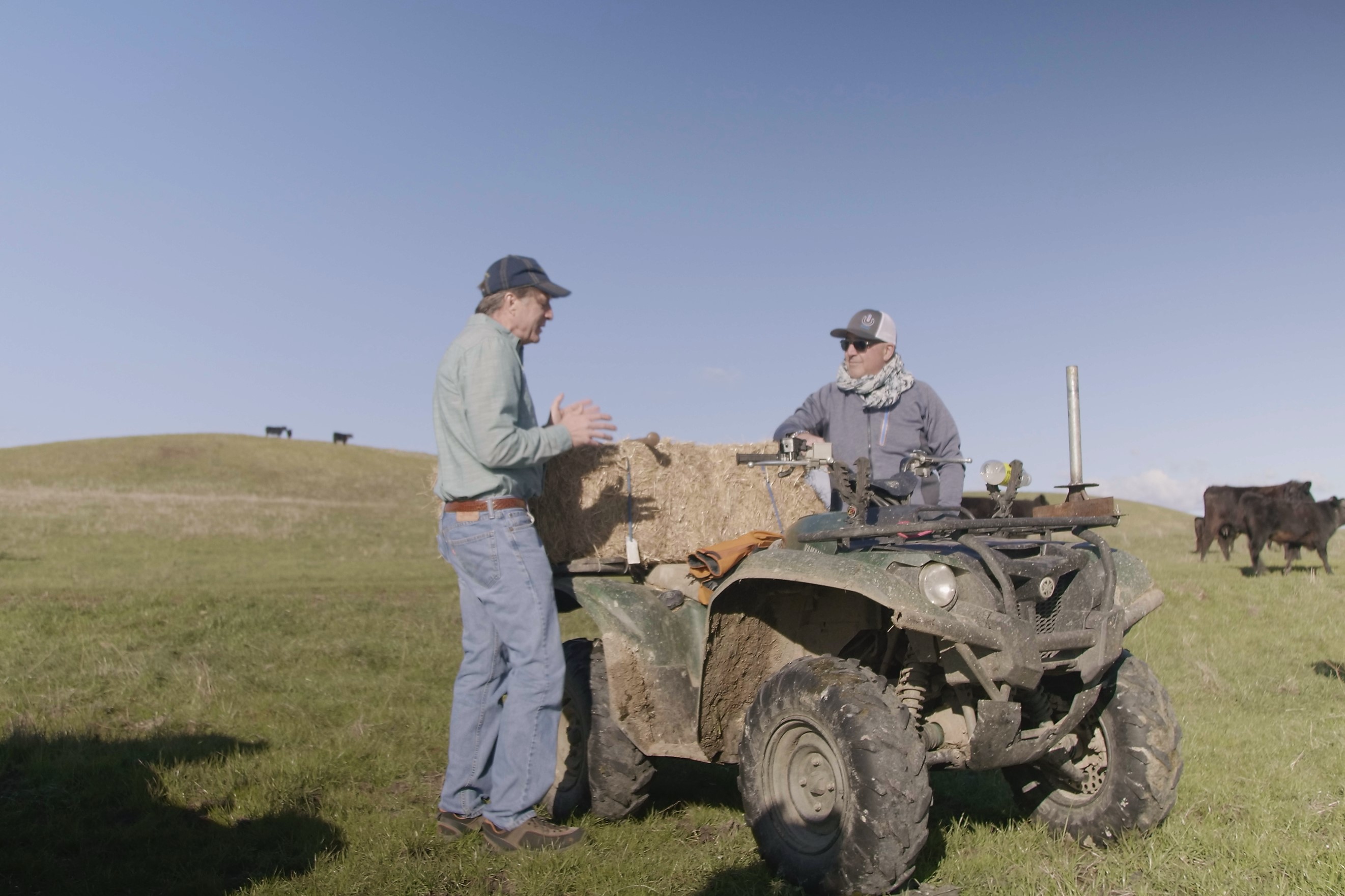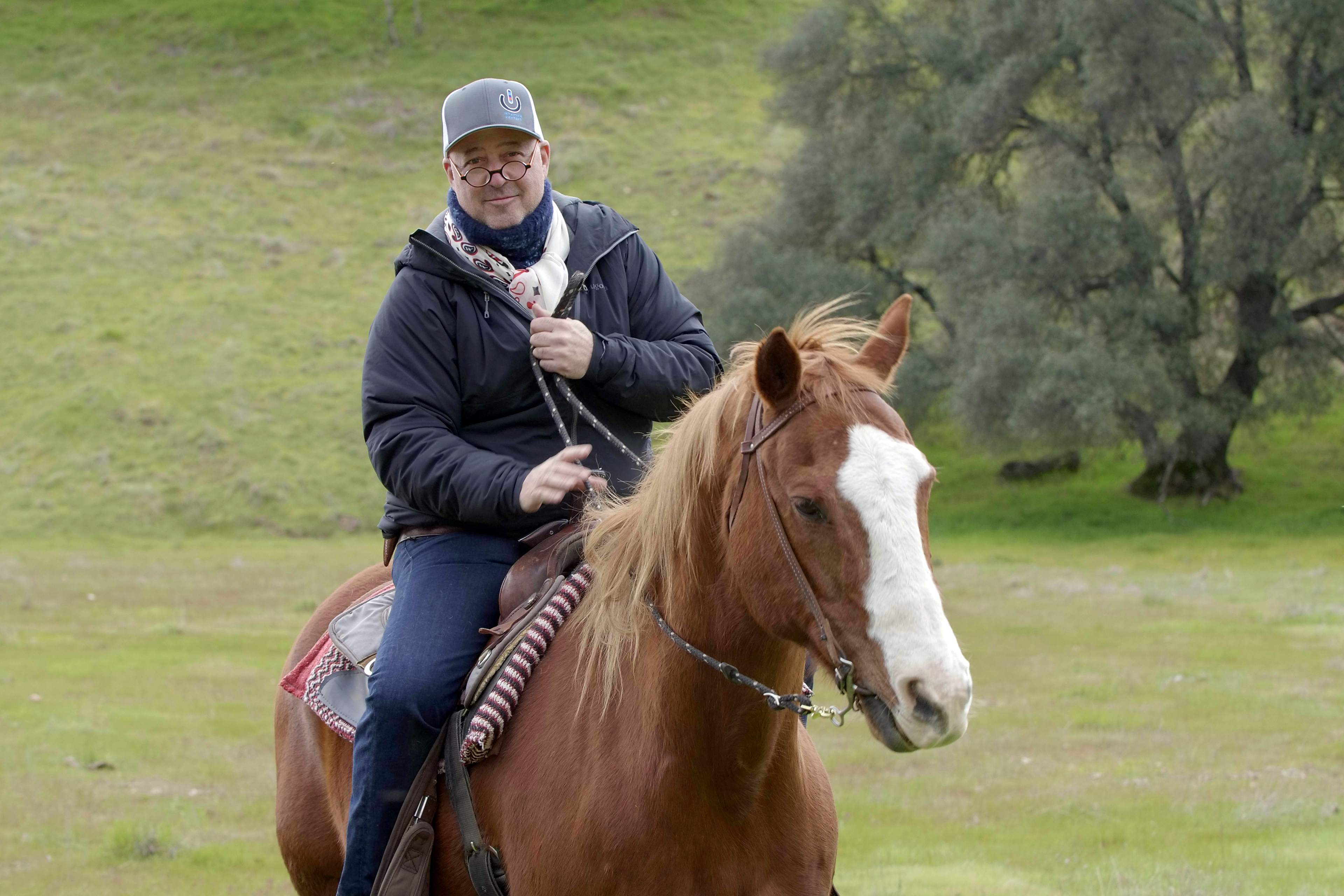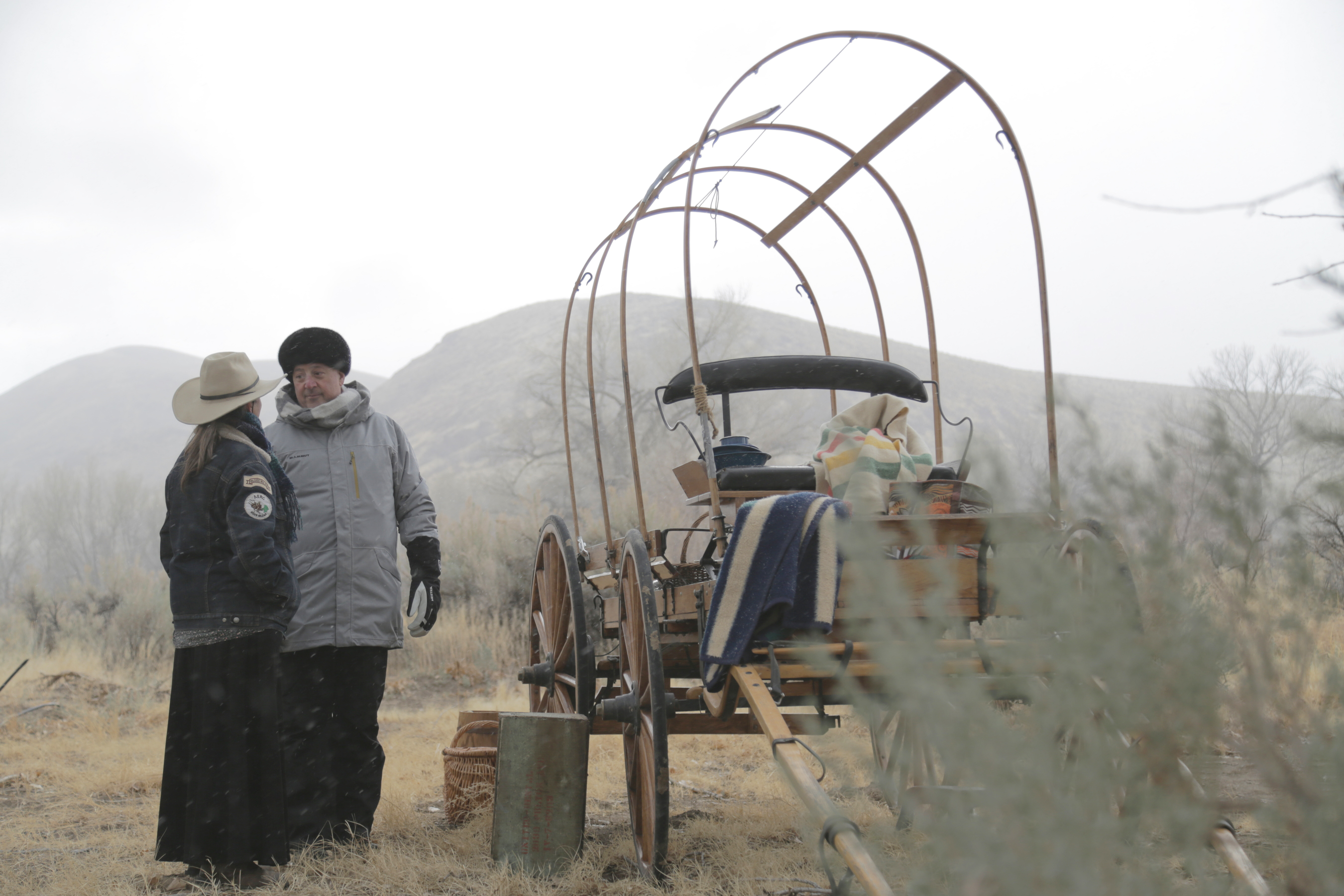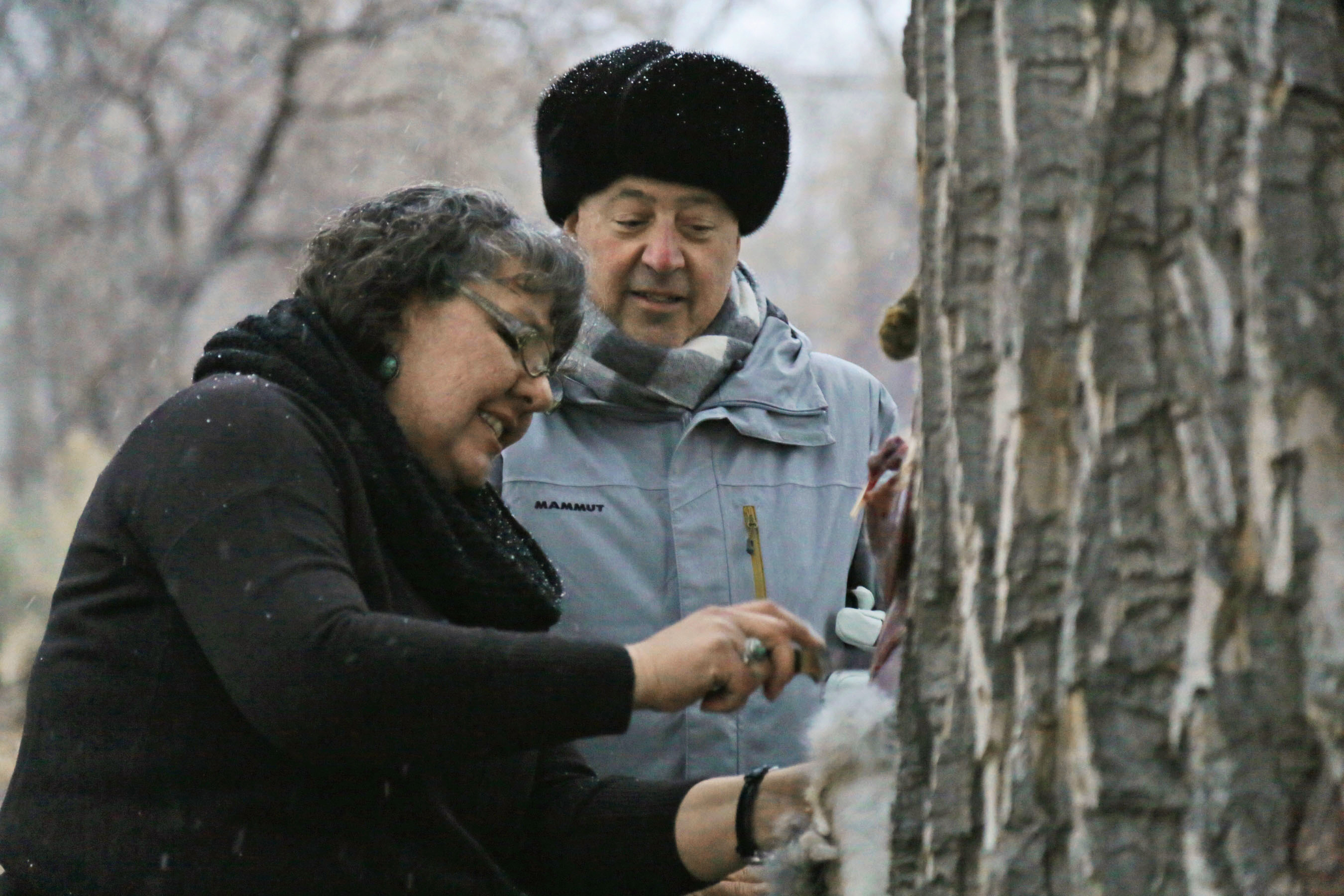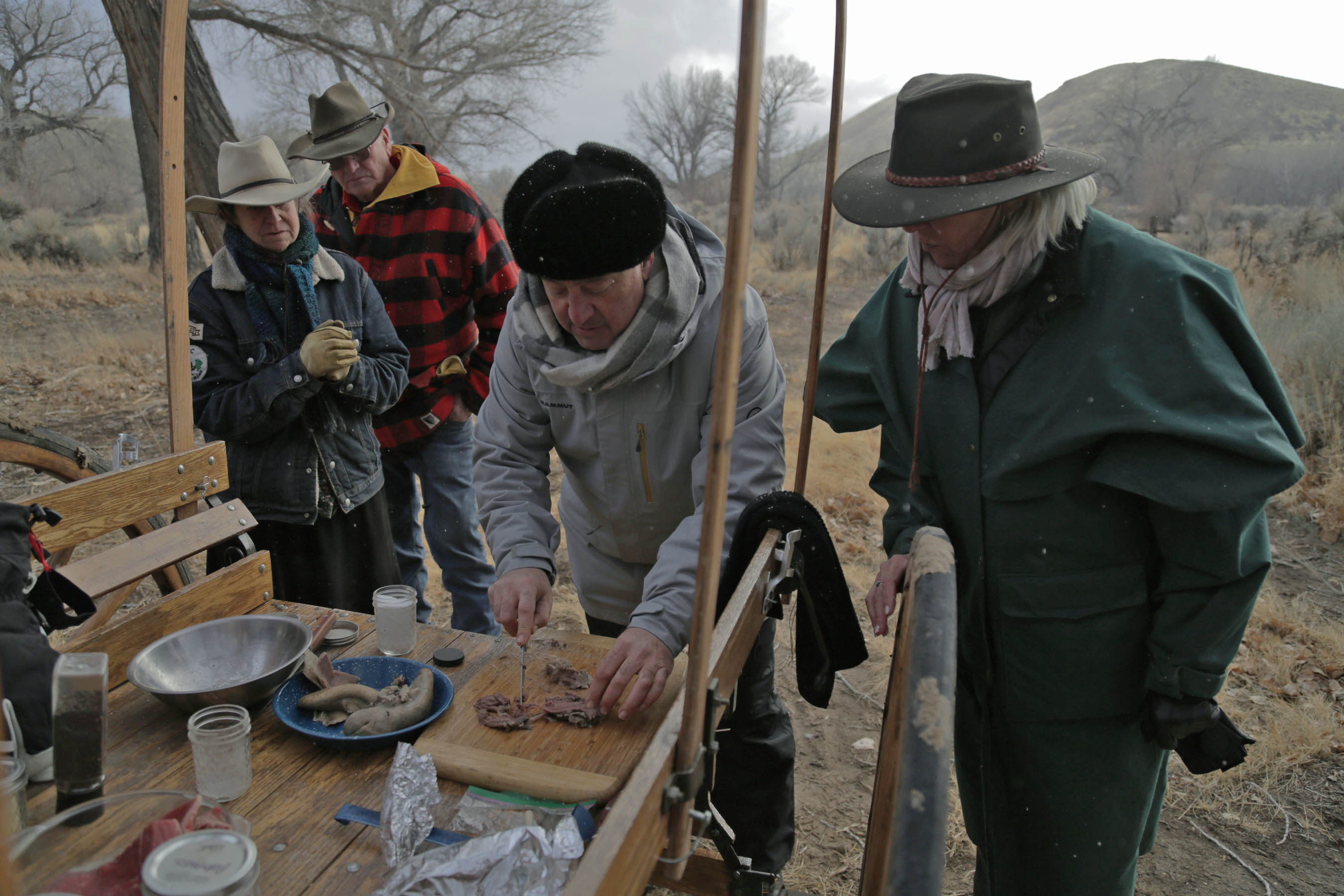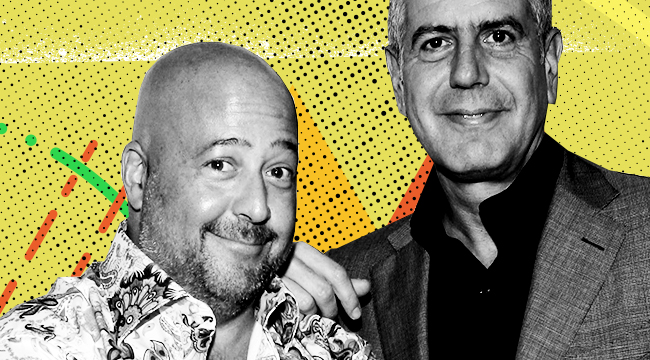
Andrew Zimmern gets it. While the original premise of his show Bizarre Foods on the Travel Channel seemed to be “dude goes someplace; eats weird sh*t” the end product has always been a rebellion against that sort of oversimplification. Like his late friend Anthony Bourdain, Zimmern’s goal was to reveal the connective power of eating together and the core values all humans share, even while living widely disparate lives.
It wasn’t only in philosophy that Bourdain and Zimmern were connected. They also shared a history of struggles with drugs and alcohol and a willingness to talk openly about addiction. This common ground, plus their mutual understanding of the celebrity machine, drew them close. Zimmern, who has been sober for more than two decades, has spoken openly in recent weeks about just how personal and painful the loss has been.
All that considered, it was a deeply reflective chef who I spoke to earlier this week as he gears up for a new season of Bizarre Foods launching Tuesday (9 pm on the Travel Channel). We talked about his loss, the values he’s fighting for, and the way he sees our current administration perceived outside of the country. At the end of our conversation, we finally got to talk about this season of his show, which focuses on historic “trails” — from the Pony Express route to the Underground Railroad. Along the way, Zimmern trades tall tales, eats everything put in front of him, and, as ever, reminds us that treating one another with humanity often starts with a meal.
I’m going to cut right to the chase, and talk about the thing that I think affected us both profoundly since the last time we talked, and that is the death of Anthony Bourdain. How are you doing with that?
Much better than I was a couple weeks ago. I think the first ten days … Well, the first ten days were awful. The first three or four days, I can’t … Only when my child was very ill do I ever remember being as distraught and unsettled, and a lot of that had to do with the fact that over the last, I don’t know, two years, we had been communicating fairly regularly through text and phone call, and we were talking a lot about relationships, and children, and pretty serious things.
He was extremely happy in his life, verbally talking about it a lot. And so when this happened, it just… on one hand, didn’t make sense to me, but I’m a recovering alcoholic and drug addict. I’ve been sober 27 years, so there are regularly people who leave my world by their own hand, and I lose a lot of other people under a lot of goofy circumstances, and it’s something that I deal with often, and I have an incredible support group and support system with my friends, and my colleagues. I do not lead a compartmentalized life and I’m very transparent about a lot of things — because I have a lot of mental health issues, and I have to live that way.
After those difficult first days, how are are you holding up now?
In the ensuing weeks, what has become readily apparent to me, because I have been talking about it with so many people, and so many people are asking me about it, is how many people, especially in my industries, the entertainment industry, and in the food world, don’t have any daily practice or daily spiritual system. They don’t have a yoga. They don’t have something that allows them to match any calamity that life fires at them with some semblance of serenity and calm.
Life is fired at everyone the same way: point blank range. We never get a warning. Parents are dying, kids are getting sick. You’re getting fired, you’re getting promoted. You’re getting married, you’re getting divorced. You can pull into the driveway with everything in your life being perfect, and think to yourself, “You know something? I’ve got the world by the balls,” and walk in the door, and find that your world has completely unraveled.
No one’s immune to that. Rich, poor, black, white, no one is singled out as having insurance against life’s slings and arrows. And so you very, very much need to have something that holds you tethered to this ground for when really, really scary shit happens.
On one hand, I was very grateful I have it. On the other hand, I desperately want to help people who don’t have access to some kind of activity, or way of looking at the world, so they can make sense of life when things get really bad. Because I think it’s the only way as human beings we can survive and thrive.
Do you see that potentially as the next initiative for you? You’ve been very involved with massive issues about the food system. Do you see helping people get the assistance they need and build themselves support systems as a possible next move?
I’ve been doing it in private for 27 years. As a recovering addict and alcoholic, service in that community is what I spend a lot of time doing. It actually is what taught me to extend my concept of service out into the non-recovering community, for the mechanisms that I’ve put in my life to support social justice issues that I believe in.
I do refugee work with the IRC. I help the homeless and those that are have fallen furthest from the safety net by board work, with services for the underserved. I’m on the board of two different hunger relief organizations, so I try to do a lot of service work. 25% of my money and time goes to service work.
But mental health parity laws, that’s something that I worked on 25 years ago in Minnesota. It was Paul Wellstone and Jim Ramstad … One of our senators, one of our congressmen. I was volunteering for their campaigns, and that was a big tentpole for them.
So I’m really trying to find the right … And I will, the right mechanisms through which to talk about this. Right now, Kat Kinsman’s web group, Chefs With Issues, is who I’m working with right now, and trying to be of service to Kat and that community. And I certainly am talking to congressmen and congresspeople and senators here in Minnesota, because I believe in growing where you’re planted, about mental health parity laws, and other things that we can do so that we can get people the help that we need, and I’m sure within a very short amount of time, I will take that to Washington DC and do what I can on those issues on a national basis.
In my obituary for Bourdain, one of the things I talked about is a tradition that I’ve always really felt like you carry on, which is that constantly removing the idea of someone or something that is foreign to you as “the other,” and as separate from you. And I have seen just about everything you’ve done, and you do all of it with that exact same humanity that he does it, which is a deep love for people, and a curiosity rather than any sort of psychic distance between you and the things you don’t know. Does that mission feel even more important now with him gone?
We both told stories very different ways, but hit on where we overlapped, and we both had very strong opinions for the necessity of that, the desire for that. That’s how we lived our lives. Tony was happier in a tiny little alley in a small little Vietnamese town, slurping noodles at someone’s stand that served maybe 20 bowls a day. I’m happiest in a tiny little hut in an African village, roasting bush meat over an open fire. It doesn’t mean that we both didn’t love Paris, and Rome, and Tokyo, and San Francisco, and Buenos Aires, and Rio, because we did. But we sought to tell stories from those places that could inform and help make this world a better place.
Both of us believed that exploring culture, and the best way to do that being through food, could help solve a lot of the world’s problems. Both of us believe that you couldn’t share a meal with someone without liking them more when you left — and I’m going to keep doing what I’m doing.
There was such an outpouring of love and admiration for this man after his passing. I think it surprised everyone. It certainly would’ve surprised him. Despite his popularity and his successes, the overwhelming global adoration for him, for the work that he did, the stories that he told, I think everyone was sort of blown away about what an important cultural icon he was. Maybe we all underestimated how valuable he was.
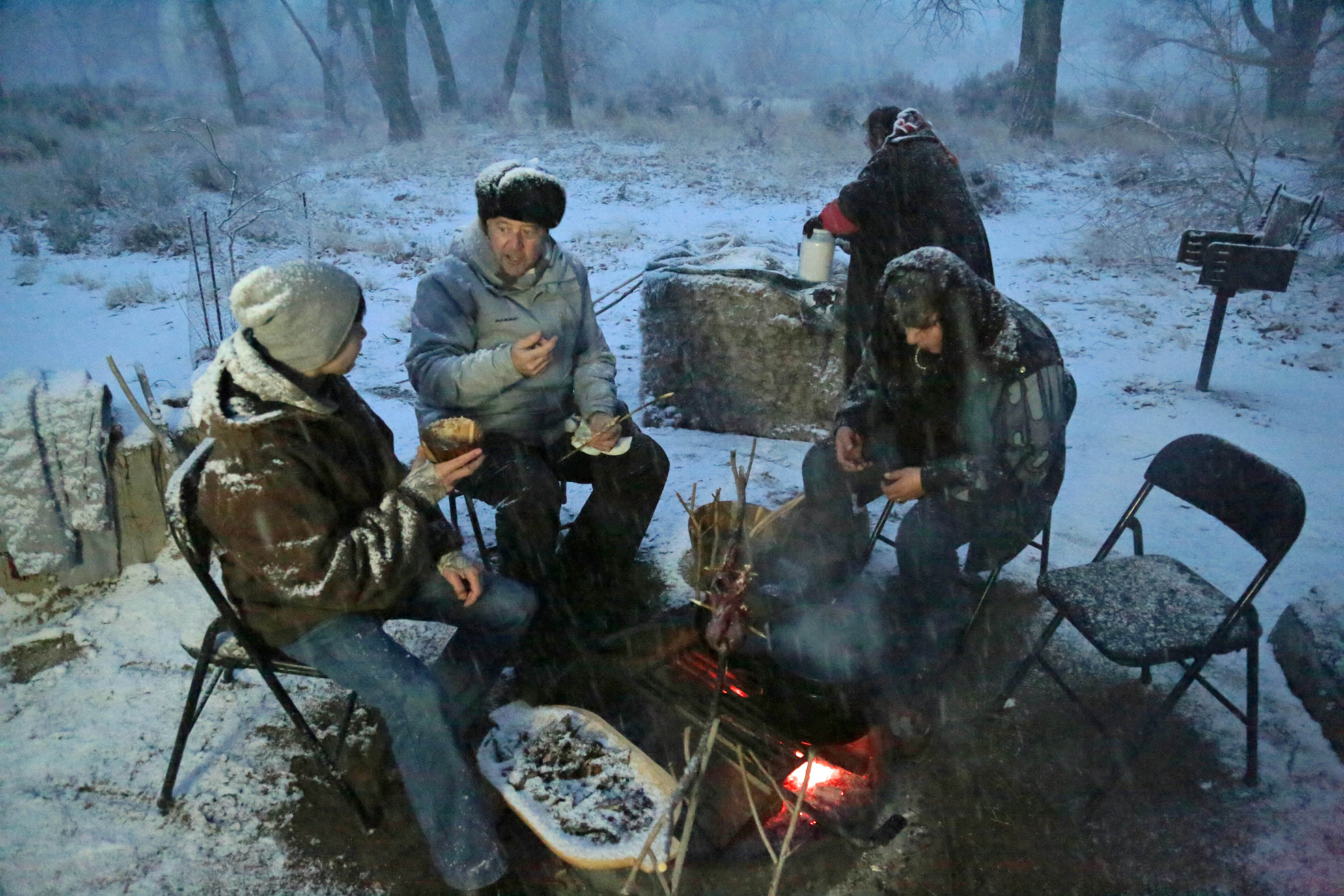
It certainly becomes clear that he was bigger than people realized.
My fear is that websites, and branded content people, and television stations, and networks are going to start looking for that next Anthony Bourdain, and try to force somebody into that role. And the problem there … I mean, people can do what they’re going to do. If it’s craven or disrespectful, that’s for someone else to decide. Certainly not for me. But I would hate to see that attitude and that work that Tony toiled mightily to put out into the world … I would hate to see that diluted by a bunch of copycat losers trying to do the same kind of TV that he did, because he was symphonic and masterful, and singular.
And I do what I do … And, look, over the last ten years, lots of other people, and lots of other networks have tried to program a similar show to his, and a similar show to mine, and it has not worked. Those people were all one-and-dones. Do I hope that the message that we both stand for is picked up by other people? You bet your ass I do. I just hope that other people come at it in an original way, because I think it’ll be more impactful to people. I would hate to see the momentum of Tony’s dreams about what the world might look like diluted by people trying to strike out in his direction and failing.
We live in an America right now where people are atomizing, and separating, and where immigration and the blending of people are being scorned — certainly in the government. How do we rebuild connection? It seems like the mission of your life at this point to connect people. Where do you see us failing, and where do we need to go?
Well, I see us failing in massive ways, in terms of how other countries and cultures are interpreting the actions of a few in this country who are representatives. The great change in my lifetime is illustrated best by the … I call it “The Pictures on the Wall” series. When I was little, I traveled around the world with my dad many times. John F. Kennedy’s picture was in every home, restaurant, hotel, and business that you went into in Europe, Asia, Africa in the 1960s. And that tradition of the portraiture of the American president hanging somewhere was a symbol that there was this dream of America and that we had an impeccable standing in the free world, and in fact, whoever sat in the Oval Office was the leader of that free world.
And it didn’t matter whether it was president … You can interpret them as successes or failures however you want. Carter, Reagan, both Bushes, Clinton, Obama, of course, had their pictures in those walls. As I travel now, I don’t see Trump’s picture anywhere, which is amazing to me. In fact, when you look from a 10,000 foot above sea level view, the isolationist nationalist tendencies of our current administration is pulling us out of everything that we have engaged in since World War I in terms of coalition building, politically and diplomatically. And it’s a very, very, very dangerous place to be, I feel.
We explore that in several of the shows that we did this year, whether it’s the Battle of the Bulge show in Belgium, exploring the Belgians love for America, and how they look at us in the world, and how the rule of America in World War II has … You look at our World War II allies today, and we’re rejecting them, and we’re sitting down for photo ops with two of the most famous despotic dictators in the 20th and 21st century in Kim Jong-un and Putin. It sends a lot of really goofy messages.
Everybody asks why I’ve turned from being a civic-minded person to a more political-minded person over the last two years, and it’s because my life’s work — which is to increase patience, tolerance, and understanding in the world by telling stories about cultures through food — was endangered by us starting to define ourselves by the things we didn’t have in common. I want to define ourselves by things we do have in common. Let’s celebrate our togetherness. Let’s celebrate our humanity, our shared humanity as citizens of this planet.
It’s a very, very, very serious challenge to that idea that’s represented by a lot of actions with the government of the country that I love. I love this country so much, so it’s a very confusing time. But I think … What’s the … I’m paraphrasing a famous quote by the old rabbi of Berlin who said, “The danger isn’t fascism or the Nazis. The danger is silence,” and I think that people like myself, who are in a position to tell stories, just need to not be silent.

Okay. I do want to ask you about the show… It’s such a fun season, and you guys did such a good job with these road trip journeys. Whether it’s you riding the Pony Express trail, or the different on-location visits that you did. What was fun for you this year?
Well, I got to drive a tank in Belgium, a real World War II tank. In fact, it was the same one that Brad Pitt drove around in the movie Fury. That was a blast. I got to go trout fishing in Scotland with Angus McFadden, who played Robert the Bruce in the Mel Gibson Braveheart, and who’s a very famous Shakespearean actor, and very famous European actor of stage and screen. There are moments like that in every show I just have to pinch myself. I’m the luckiest man in the world that I get to work for such a great network that allows me the opportunity to go around and do what I want to do, and tell the stories that I want to tell.
